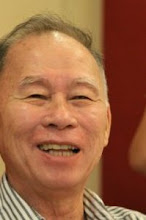This commentary
serves to introduce the excellent column of Ana Marie Pamintuan of The
Philippine Star.
This is
particularly addressed to my colleagues in the pre-departure area, the
not-so-young who are keenly aware of what transpired during the Martial Law
years and lived through other horrors thereafter.
From the time we Filipinos found
ourselves free from colonial rule to be on our own, successive Philippine
presidents have led us gradually down to perdition. We hit a snag during
Martial Law years and exalted in the successful People Power Revolution hoping
the spiral had been halted.
But then the prevailing
feudalism and political dynasties were resurrected and corruption continued
unabated gathering momentum. People power vainly tried to intervene in more
than one instance, but our damaged electorate put back in power the same feudal
families. The rich got richer and the poor became poorer!
Then, out of
the blue, a neophyte from the same feudal mould and following the tried and
true political route, was elected president. To everyone’s surprise, through
his heart-felt battle cry of treading the straight path, he has since put the
Philippines on the way to become an Asian Tiger. Unfortunately, his efforts
have stirred up enough dust and dirt that forced the traditional feudal lords
to be in offensive mode and again ready to negate whatever gains have already been
attained.
After the
Supertyphoon Yolanda’s fury, foreigners assisting survivors were impressed saying
that our country is a country of ever smiling and resilient people. It’s a good
tourism gimmick, but it can indicate a negative image – we easily forget.
This short
memory lapses seem to have been the destiny of this country for decades ever
since Filipinos took the helm of nation-building in their own hands. For some
time going into the ’60s, the Philippines was considered the shining star of
the East.
Then, for some
reason, our country overnight found itself as the sick man of Asia. Even
shamefully, in recent years, we’d heard of Vietnam and Laos being praised for
their vibrant progression towards economic salvation. That was long after the
world acknowledged the emergence of Malaysia, Singapore, Thailand and China as
economic powers.
We have had our
share of colorful presidents, who have tried every kind of recipe in the book
to cook up a path of economic emancipation, including holding midnight drinking
cabinets and lengthening their stay in government over the regular prescribed
period.
They say six
years is too short for a good president, and too long for a bad one. I’d like
to think that time is not really the big issue here.
Here lies the crux of the matter: it
should be the mindset of both our elected officials and those that elect them
that a public post is more than a position of trust. We must have people in
governance who will truly work for the country’s 100 million people’s welfare.
Why do we never
learn?
There are so
many reasons. One lies in our educational system which has diminished not just
scholarship but excellence. There is less emphasis now on the humanities, in
the study of the classics which enables us to have a broader grasp of our past
and the philosophies of this past. We envy Hindus and Buddhists who have in
their religion philosophy and ancestor worship that build in the believer a
continuity with the past, and that most important ingredient in the building of
a nation — memory.
We even allow disgraced
criminals to be recycled in government service.
The intelligent
person is aware of his shortcomings. He is humble enough to ask the opinion of
those who know more than him on particular subjects. If he is a government
hierarch, he will surround himself with advisers who can supply him with
guidance and background possessing more knowledge, experience and wisdom than
him. Such an official is bound to commit fewer mistakes because he knows
himself. But, of course, how can he get there unless ironically he had played
along with predecessors.
This is how we
show our perennial weakness for short-sightedness and apathy. Patience and
fortitude have been traits that Filipinos take pride in - even to a fault. We
say “bahala na” suffering incompetence and shabby work without a whimper of
protest. We smile shrugging off misery that normally would have made other
peoples scream and run amuck.
Again, the
world looks at the Philippines as being at the brink of joining other emerging
economies. This SHOULD be flattering to ALL Filipinos. We are given a
head-start that is grounded on something substantial that will really form the
basis for future growth.
Needless to
say, we have to unify and get our act together this time. The reality is that
if we bungle this opportunity, the chance to move forward may not come again in
a very long time. Think Filipino! You have a right to know and keep remembering.



